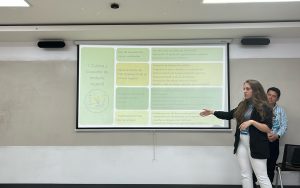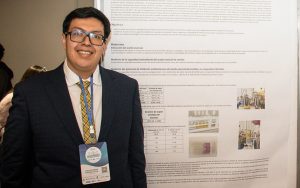Written by Ana Lucía Solano
One of the main goals of the ASPIRE Project is to promote multidisciplinary and multisectoral research. In support of this objective, the UVG Industrial Engineering and Food Engineering departments, along with students from the Food Business and Marketing degree programs, participated in collaborative research with different industry partners.
The collaboration provided the opportunity to collect valuable information and share their recommendations regarding six value chains relevant to Guatemala for the students’ final research projects. The six value chains include snow peas, avocados, cardamom, essential oils, shrimp, and sustainable tourism.
The Industrial Engineering students focused on the assessment of strategies, opportunities, and challenges for these products in their respective national and global value chains. The Food Engineering students then used the Industrial Engineering students’ findings, (carried out the semester before) to develop innovative products or processes that could respond to the needs or opportunities identified by the Industrial Engineering students.

Ana Lucía Pineta at the Congress of the Institute of Industrial and Systems Engineers (IISE), held in Colombia. Photo: Ingrid de León
This research was also carried out in collaboration with and support from stakeholders in the value chain, such as coordinators of the AGEXPORT commissions, business owners, and producers.
The essential oils value chain
Essential oils are products that have seen a significant boom in the national and international market in recent years. They are widely used in the pharmaceutical, cosmetic, food, and agricultural industries, among others. Guatemala has significant commercial value potential for the production of plants for the extraction of essential oils.
The work of the Industrial Engineering student, Ana Lucía Pineta, focused on identifying the improvement strategies and opportunities of this value chain, identifying and validating three specific strategies:
1. Production with backward vertical integration for export in an unconsolidated market to the United Kingdom, Germany, the United States, and France for the following plants: chamomile, melissa (citronella), and neroli (bitter orange).
2. Become suppliers of essential oils for the international company DoTERRA.
3. Chaining of national actors for the end-to-end use of lemon.
Another plant of commercial interest with potential in the essential oils industry is thyme. Carlos Rodrigo Choxom, in the Food Engineering program, focused his graduation work on the extraction, characterization, and evaluation of the antioxidant and antibacterial inhibition capacity of thyme’s essential oil (Thymus vulgaris) and its respective hydrolate, through the use of traditional enzymatic and ultrasound methods. Carlos concluded that thyme’s essential oil has an effective antibacterial action, even in low concentrations against bacteria such as E. Coli and Salmonella. His findings demonstrate thyme’s essential oil potential in the pharmaceutical, food, and agricultural industries.
Ana Lucía Pineta presented her research at the II Scientific Congress for Peace and Development held by the UVG Research Institute, and at the Institute of Industrial and Systems Engineers (IISE) conference last September in Bogotá, Colombia, where she received recognition for best IISE summary.

Carlos Rodrigo Choxom presenting at the National Congress of Biological Chemists in 2023. Photo: Enrique Padilla.
Carlos Rodrigo Choxom presented his work at the National Congress of Biological Chemists, held in November in Guatemala City in the category of ‘free works,’ where he won first place.
These projects have involved students in real challenges, strengthening their skills as future professionals, and at the same time, provided valuable information for the essential oils sector, data that will be used to improve the production and marketing processes of their products.
About ASPIRE
The Achieving Sustainable Partnerships for Innovation, Research and Entrepreneurship (ASPIRE) Project is a five year, $15 million project funded by USAID and implemented by the Massachusetts Institute of Technology (MIT), Universidad del Valle de Guatemala (UVG), and the Guatemalan Exporters Association (AGEXPORT). Its goal is to create and share replicable models for how Latin American universities, in collaboration with the private sector, government, and local communities, can respond to local and regional development needs. The project implements a collaborative approach to research, teaching, innovation, entrepreneurship, and tech transfer, based on the combination of local assets and knowledge with MIT’s experience in the innovation ecosystem.